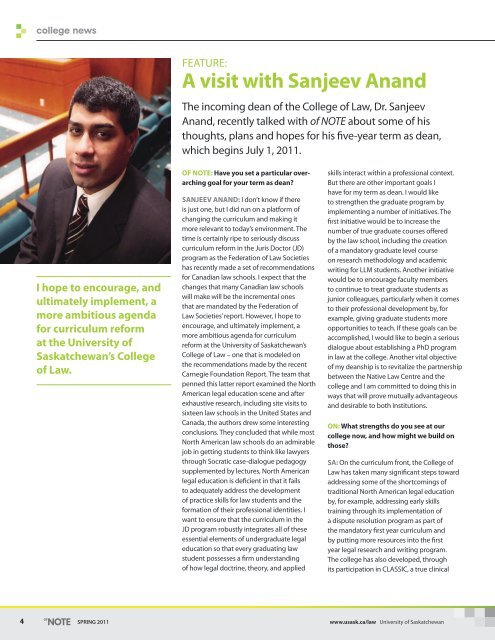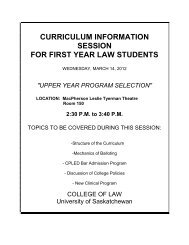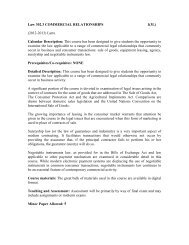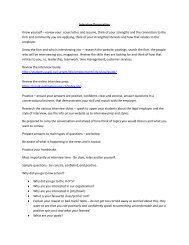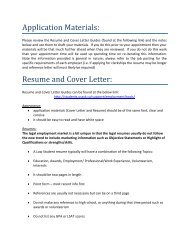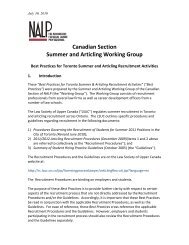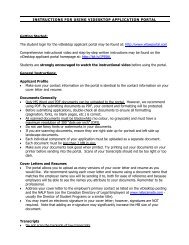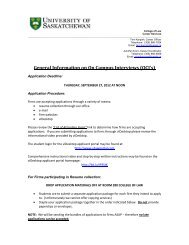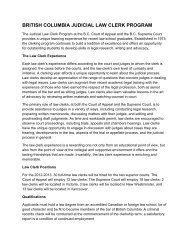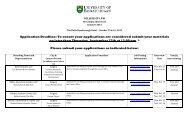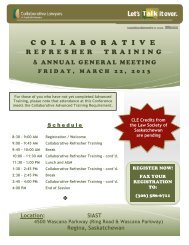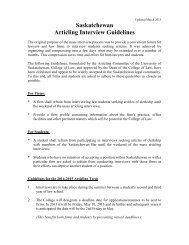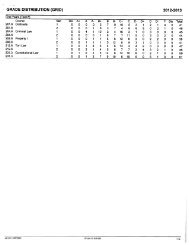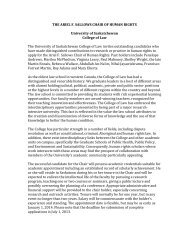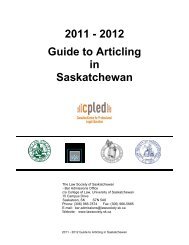Spring 2011 - College of Law - University of Saskatchewan
Spring 2011 - College of Law - University of Saskatchewan
Spring 2011 - College of Law - University of Saskatchewan
You also want an ePaper? Increase the reach of your titles
YUMPU automatically turns print PDFs into web optimized ePapers that Google loves.
college news<br />
i hope to encourage, and<br />
ultimately implement, a<br />
more ambitious agenda<br />
for curriculum reform<br />
at the university <strong>of</strong><br />
<strong>Saskatchewan</strong>’s <strong>College</strong><br />
<strong>of</strong> law.<br />
FEATURE:<br />
A visit with Sanjeev Anand<br />
The incoming dean <strong>of</strong> the <strong>College</strong> <strong>of</strong> <strong>Law</strong>, Dr. Sanjeev<br />
Anand, recently talked with <strong>of</strong> NOTE about some <strong>of</strong> his<br />
thoughts, plans and hopes for his five-year term as dean,<br />
which begins July 1, <strong>2011</strong>.<br />
Of nOTE: Have you set a particular overarching<br />
goal for your term as dean?<br />
SAnjEEV AnAnD: I don’t know if there<br />
is just one, but I did run on a platform <strong>of</strong><br />
changing the curriculum and making it<br />
more relevant to today’s environment. The<br />
time is certainly ripe to seriously discuss<br />
curriculum reform in the Juris Doctor (JD)<br />
program as the Federation <strong>of</strong> <strong>Law</strong> Societies<br />
has recently made a set <strong>of</strong> recommendations<br />
for Canadian law schools. I expect that the<br />
changes that many Canadian law schools<br />
will make will be the incremental ones<br />
that are mandated by the Federation <strong>of</strong><br />
<strong>Law</strong> Societies’ report. However, I hope to<br />
encourage, and ultimately implement, a<br />
more ambitious agenda for curriculum<br />
reform at the <strong>University</strong> <strong>of</strong> <strong>Saskatchewan</strong>’s<br />
<strong>College</strong> <strong>of</strong> <strong>Law</strong> – one that is modeled on<br />
the recommendations made by the recent<br />
Carnegie Foundation Report. The team that<br />
penned this latter report examined the North<br />
American legal education scene and after<br />
exhaustive research, including site visits to<br />
sixteen law schools in the United States and<br />
Canada, the authors drew some interesting<br />
conclusions. They concluded that while most<br />
North American law schools do an admirable<br />
job in getting students to think like lawyers<br />
through Socratic case-dialogue pedagogy<br />
supplemented by lectures, North American<br />
legal education is deficient in that it fails<br />
to adequately address the development<br />
<strong>of</strong> practice skills for law students and the<br />
formation <strong>of</strong> their pr<strong>of</strong>essional identities. I<br />
want to ensure that the curriculum in the<br />
JD program robustly integrates all <strong>of</strong> these<br />
essential elements <strong>of</strong> undergraduate legal<br />
education so that every graduating law<br />
student possesses a firm understanding<br />
<strong>of</strong> how legal doctrine, theory, and applied<br />
skills interact within a pr<strong>of</strong>essional context.<br />
But there are other important goals I<br />
have for my term as dean. I would like<br />
to strengthen the graduate program by<br />
implementing a number <strong>of</strong> initiatives. The<br />
first initiative would be to increase the<br />
number <strong>of</strong> true graduate courses <strong>of</strong>fered<br />
by the law school, including the creation<br />
<strong>of</strong> a mandatory graduate level course<br />
on research methodology and academic<br />
writing for LLM students. Another initiative<br />
would be to encourage faculty members<br />
to continue to treat graduate students as<br />
junior colleagues, particularly when it comes<br />
to their pr<strong>of</strong>essional development by, for<br />
example, giving graduate students more<br />
opportunities to teach. If these goals can be<br />
accomplished, I would like to begin a serious<br />
dialogue about establishing a PhD program<br />
in law at the college. Another vital objective<br />
<strong>of</strong> my deanship is to revitalize the partnership<br />
between the Native <strong>Law</strong> Centre and the<br />
college and I am committed to doing this in<br />
ways that will prove mutually advantageous<br />
and desirable to both institutions.<br />
On: What strengths do you see at our<br />
college now, and how might we build on<br />
those?<br />
SA: On the curriculum front, the <strong>College</strong> <strong>of</strong><br />
<strong>Law</strong> has taken many significant steps toward<br />
addressing some <strong>of</strong> the shortcomings <strong>of</strong><br />
traditional North American legal education<br />
by, for example, addressing early skills<br />
training through its implementation <strong>of</strong><br />
a dispute resolution program as part <strong>of</strong><br />
the mandatory first year curriculum and<br />
by putting more resources into the first<br />
year legal research and writing program.<br />
The college has also developed, through<br />
its participation in CLASSIC, a true clinical<br />
4 SPRING <strong>2011</strong> www.usask.ca/law <strong>University</strong> <strong>of</strong> <strong>Saskatchewan</strong>


